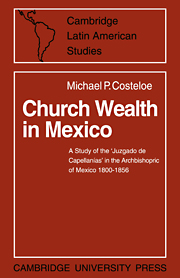 Church Wealth in Mexico
Church Wealth in Mexico Book contents
- Frontmatter
- Contents
- Acknowledgements
- Preface
- Abbreviations
- Introduction
- 1 The Juzgado de Capellanías. Organization and employees
- 2 The Juzgado and its revenue
- 3 Personal loans from the Juzgado
- 4 The effects of clerical investment
- 5 The Juzgado and the State
- Conclusion
- List of sources and works cited
- Index
5 - The Juzgado and the State
Published online by Cambridge University Press: 27 March 2010
- Frontmatter
- Contents
- Acknowledgements
- Preface
- Abbreviations
- Introduction
- 1 The Juzgado de Capellanías. Organization and employees
- 2 The Juzgado and its revenue
- 3 Personal loans from the Juzgado
- 4 The effects of clerical investment
- 5 The Juzgado and the State
- Conclusion
- List of sources and works cited
- Index
Summary
In comparison with other clerical corporations such as the convents and monasteries, the position of the Juzgado within independent Mexico was relatively secure and no direct attempt at abolition was made even when the liberals were in full control of the national government. This was mainly due to the nature of the institution and its activities for, although a unit within the corporate body of the Church, the Juzgado was in most respects a secular organization. Its employees, with the important exception of the Judge, were rarely ordained members of the Church, and its daily business was almost exclusively concerned, either directly or indirectly, with commercial and financial matters. Furthermore, even though its capital and revenue were considered to be sacred funds, the Fiscal rightly pointed out in 1813 that the many capellanías managed by the officials were not really ecclesiastical benefices, but were rather trust funds which the wealthy had established for the use of their descendants. Hence the Church as a whole in fact received little financial return from the capellanías, for the only obligation laid upon the recipient, to whom the net income was paid, was to say a certain number of masses each year for the soul of his benefactor. The capellanes had to be ordained but they were not required to perform any religious or spiritual exercise which brought material benefit to the Church. In many cases they became clerics only in order to qualify for a benefice.
- Type
- Chapter
- Information
- Church Wealth in MexicoA Study of the 'Juzgado de Capellanias' in the Archbishopric of Mexico 1800–1856, pp. 108 - 126Publisher: Cambridge University PressPrint publication year: 1967


